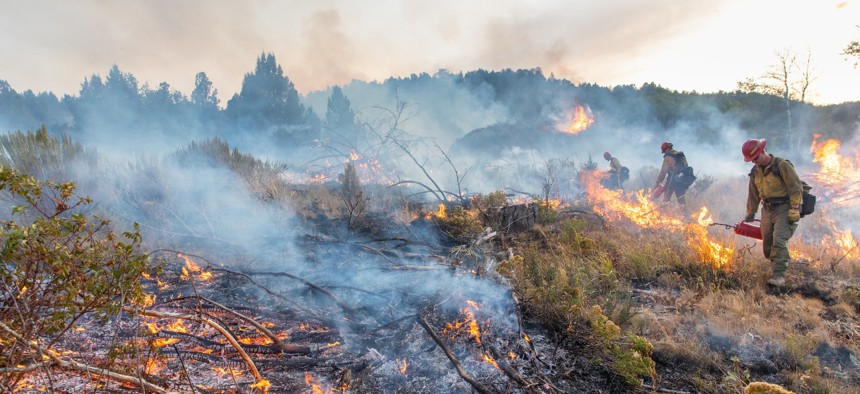
Firefighters use drip torches to light vegetation along a control line on the Bureau of Land Management's Trout Springs Prescribed Fire in southwest Idaho. Neal Herbert / DOI file photo
It's Now Easier for Federal Firefighters to File for Workers Comp
For an array of chronic illnesses that have been linked with firefighting as a profession, federal firefighters will no longer have to prove precisely what incident caused their ailment.
The Labor Department on Wednesday announced that it was easing the burden federal firefighters have to prove that certain chronic illnesses were on-the-job injuries when filing for workers compensation benefits.
Unlike their state- and locally employed counterparts, federal firefighters have often had to try to prove that chronic conditions like lung cancer developed as a result of their work when filing for workers compensation benefits under the Federal Employees’ Compensation Act. That has led to frustration, delays in receiving benefits, and sometimes even denials.
Christopher Godrey, director of the Labor Department’s Office of Workers’ Compensation, announced Wednesday that his office has labeled a number of cancers and other chronic heart and lung conditions as “high risk” for federal firefighters, effectively waiving the requirement that those employees submit additional evidence to prove a causal relationship between their work and their condition. Additionally, all claims submitted by federal firefighters will be handled by a newly created special claims unit and workers compensation requests will be handled by employees with special training to handle firefighters' claims.
“Among our nation’s public service workers, federal firefighters are some of the bravest,” Godfrey said. “Historically, they have faced unique challenges in establishing causation for occupational disease claims. The policy changes we are making will help us improve our service to federal firefighters and assist them through the claims process.”
In order to qualify as a “high risk” claim, employees must be diagnosed with one of the following cancers: esophageal, colorectal, prostate, testicular, kidney, bladder, brain, lung, buccal cavity or pharynx, thyroid, multiple myeloma, non-Hodgkin’s lymphoma, leukemia, mesothelioma or melanoma; or hypertension, coronary artery disease, chronic obstructive pulmonary disease, pulmonary fibrosis, asthma, or a sudden heart attack or stroke.
Additionally, the federal employee must have been engaged in firefighting for at least five years and they must be diagnosed with one of these conditions within 10 years of their last exposure to firefighting. In the instance of sudden heart attacks or strokes, the employee must have experienced the injury within 24 hours of “fire protection or suppression activities.”
“If the claim meets the high-risk criteria, the employee does not need to submit additional evidence of specific exposures or medical evidence addressing causal relationship,” the Labor Department wrote in a document describing the new policy. “Their case will be reviewed by a district medical advisor for verification that the employment was capable of producing the diagnosed conditions.”
Washington has kept a close eye on issues affecting federal firefighters over the last year. Last year, President Biden shepherded the establishment of cash bonuses and other monetary awards to ensure that all federal firefighters make at least $15 per hour, until the Office of Personnel Management could introduce guidance to raise the federal minimum wage to $15 an hour.
And a House committee last month advanced legislation that would remove the evidentiary burden where firefighters would have to prove that a variety of chronic conditions were developed on the job for the purposes of making a workers compensation claim. That bill is still awaiting a final vote on the House floor.
In a statement, National Federation of Federal Employees National President Randy Erwin, whose union represents many federal firefighters, applauded the Labor Department’s effort to implement that policy administratively.
“It is critical that the government ensures our federal firefighters have access to proper health care and receive compensation for treatment related to occupational injuries and illnesses,” Erwin said. “The policies announced today will go a long way to help firefighters who have been injured or developed illnesses from protecting the country and their neighbors from fires.”







